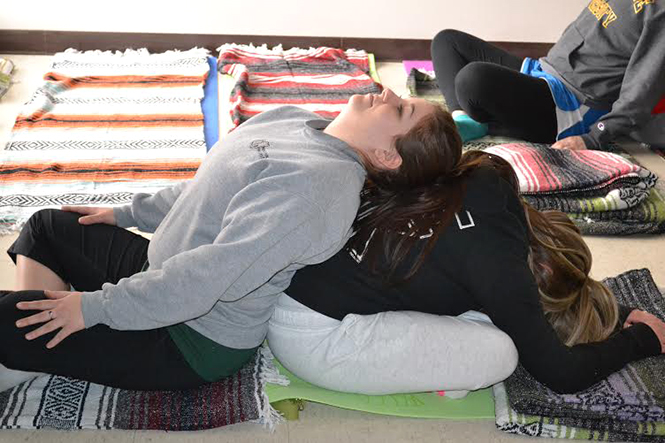KSU College of Nursing’s self-care program helps students focus
Nursing students in Kent State’s College of Nursing’s Interprofessional Institute for Self-Care use yoga, aromatherapy and mindful breathing to help them take care of themselves.
“Nurses are notorious for not taking care of themselves,” said Barb Drew, associate nursing professor and principal investigator of the evaluation of self-care modalities.
A layered technique is used in the program, focusing on a combination of yoga, aromatherapy and breathing, said Michelle Bozeman, outreach program director for the College of Nursing.
The self-care program is especially promoted during finals week when the Self Care Café is set up in Henderson Hall. The program sets up yoga mats, puts out essential oils and puts meditation and relaxation apps on computers for students to use, Drew said.
The institute also has created a mobile app for students to use throughout the semester.
The topics the institute is focusing on this semester are insomnia, exhaustion and anxiety, Bozeman said.
“We found those were the things students most needed help with,” she said.
This year, Bozeman said the program has had approximately 7,000 interactions with students, faculty, staff and the community. These interactions include both those who have participated in self-care and those who have been informed about it.
Tracey Motter, senior academic program director in the College of Nursing, created the program in Fall 2009. She started the program with accelerated students in mind.
Accelerated students are second-degree students who complete the four-year nursing program in 15 months. With such a vigorous schedule, Motter said she wanted to give these students an opportunity to learn how to take care of themselves so they could better care for others.
“It was a way to teach them how to deal with stress in a positive way,” she said. “There’s a lot of emotional baggage nurses have to deal with every day, and that has a lot to do with burnout. And you can’t give away what you don’t have.”
Initially, students had self-care sessions with an instructor once a week, but the cost was too high to maintain these weekly sessions, Motter said. She helped the program transition to one with less guided instruction and more work done on the students’ own time. Students now participate in self-care for about an hour a week on average.
“We want to keep it simple and keep it something they can do in the moment,” she said. “That’s how they’re going to carry it to being a nurse. You can’t leave the floor for a half hour to do yoga.”
Drew planned an evaluation of the program in Spring 2010. A perceived stress scale and a mindful-attention awareness scale (or something measuring students’ ability to focus) were used to compare 18 accelerated students who participated in self-care to 20 traditional students who did not.
“(With) students who participated in self-care, their stress levels were consistent throughout the semester,” Drew said. “(With) students who didn’t participate in self-care, their stress went up.”
The mindful-attention awareness results were inconclusive.
A second study in the Spring 2011 expanded to include students from Ursuline College and Cleveland State University. The study, which compared 51 accelerated students with 63 traditional students, had similar findings.
Self-care was introduced to traditional students in 2012 and is now taught in FYE classes and sophomore classes.
The institute is especially focused on teaching self-care to freshmen, Motter said. Freshmen are making the transition to college and trying to get into the nursing program. When one C in a science class can stop you from getting into the program, Motter said many pre-nursing freshmen don’t take care of themselves as well as they should.
A version of the self-care café will be in Centennial Courts C and D in December after RAs there asked for it to be set up.
Motter said the program has expanded and become more solidified since it began in 2009.
“It’s sort of seeping into everything that we do,” Bozeman said.
Motter said she wants to teach nursing students to slow down and focus on one task at a time rather than multitask to prevent errors that can harm patients, such as errors in medication administration. There are 98,000 injuries a year caused by medication errors, which makes it more dangerous to go to the hospital than drive a car, Motter said.
Drew is working on analyzing questionnaires from students in which they were asked open-ended questions about their participation in the self-care program. She is also working on determining if self-care should be included more in classes.
“There are things that we have to weigh,” she said. “Is it worthwhile to take away time from other things that are important for students to learn and replace it with this? There’s debate about that.”
However, Drew thinks it’s a valuable program for nursing students.
“Sometimes students need the opportunity to be in the position to learn to value self-care early in their career,” she said. “Unless we offer this to students, they won’t be interested in taking care of themselves.”
Bozeman agreed, saying students learn how to take care of themselves so they can better care for patients.
“The health care environment is challenging, and being able to give our students this skill set allows them to build themselves around it,” she said. “It gives them that self-awareness and self-recognition.”
For more information on the Interprofessional Institute for Self-Care, go to https://nursing.kent.edu/iisc/.
Contact Emily Mills at [email protected].



